Movie Review – Wes Craven’s New Nightmare
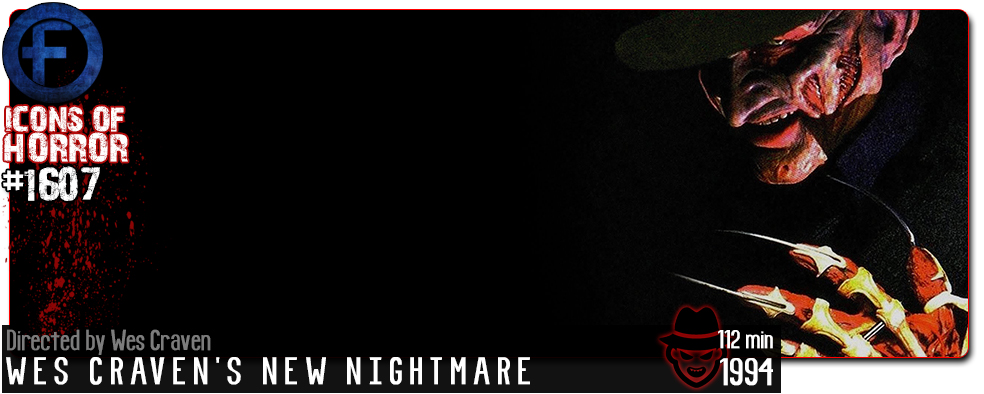
Principal Cast : Heather Langenkamp, Robert Englund, Miko Hughes, John Saxon, Tracy Middendorf, David Newsom, Fran Bennett, Wes Craven, Robert Shaye, Marianna Maddalena, Sam Rubin, Sara Risher, Claudia Hero, Matt Winston, Rob LaBelle, W Earle Brown, Lin Shaye.
Synopsis: A demonic force has chosen Freddy Krueger as its portal to the real world. Can Heather Langenkamp play the part of Nancy one last time and trap the evil trying to enter our world?
***
If you’re the creator of a hugely successful box-office horror franchise, and the series has pretty much done everything it’s possible to do, how to you reinvent things to bring new life to the property? For Wes Craven, the creator of the Nightmare On Elm Street franchise, how to reinvent a monster he watched transform the supernatural horror genre from hokey bloody D-movies into box-office winners, Freddy Krueger, was the challenge. Krueger’s character had grown from the primordial presence of Craven’s own original film to a fleshed out (ha!) character of his own mythology by the time we get to The Final Nightmare, the sixth film in the franchise by the time it petered out in 1991, with the series having grown stale as its numerical chronology ever grew. Craven’s idea was brilliantly simple: make the seventh film essentially a movie-within-a-movie meta film, in which the actual actors from the original film played themselves, having to defeat a supernatural spirit from bringing Freddy to the “real world”, with notable cameos by New Line staff and various others threaded throughout the story.
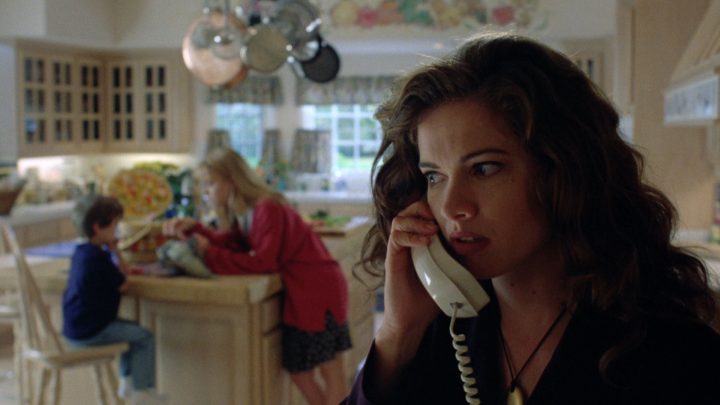
Nightmare On Elm Street star Heather Langenkamp is having bad dreams again, dreams of Freddy Krueger, the character she battled in the movie franchise she appeared in. Her son, Dylan (Miko Hughes) is also experiencing bizarre behaviour changes, including dreams and visions of a “man with claws” at the end of his bed. When Heather is approached by the boss of New Line, Robert Shaye, to return to the Nightmare franchise, and director Wes Craven writes a new script, Heather’s life spirals out of control: her husband, Chase (David Newsom) dies in a car accident (at the hands of a gloved monster beneath his seat), Dylan continues to put himself in harms way and engages with her in a spooky, ethereal way, and the rest of the production on the new film seems ill-at-ease and problematic. Heather contacts her friends, including Freddy actor Robert Englund, as well as one-time on-screen father John Saxon, for advice, but she comes to the understanding that she must battle whatever spirit is attacking her on her own.
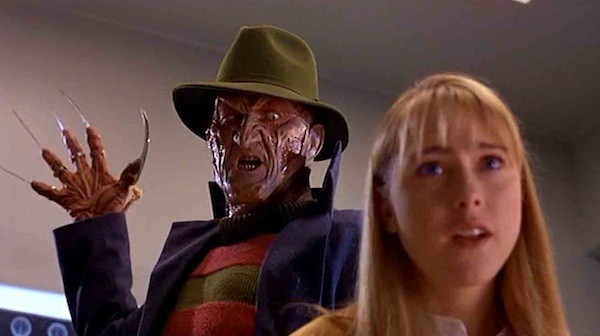
Picture in your mind the perfect horror film. The one that can affect you most, the one that sends a thrill up your spine, the one that gives you… er… nightmares. The best kinds of horror film are those that typically put the most urbane, non-threatening environments into center frame, then tip up the terror through skewing those environments into just enough weirdness and creepy discordance that your skin literally ripples with fear. Making the most warm and benign places insidiously creepy is the easiest way to get under a viewer’s skin, and Wes Craven’s New Nightmare does that brilliantly. Using the Krueger elements in “our world”, turning the actors into real people within the context of this story, making Freddy a far more powerful threat than he ever was in the “fictional” movies, is a genius move by Craven, shifting Heather Langenkamp into not just a film heroine but a “real life” heroine as well.
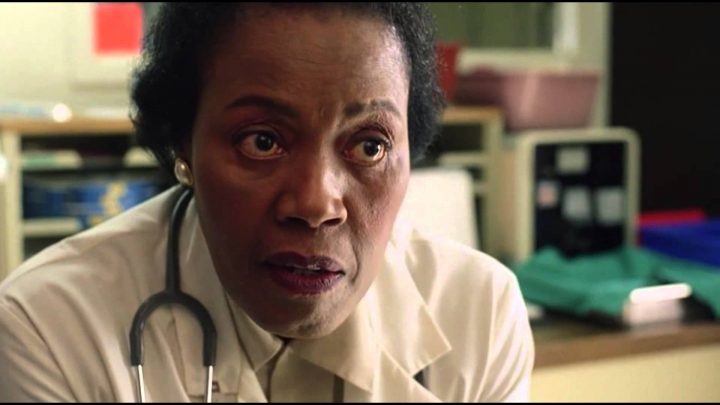
Of course, another key element to any successful horror film franchise is using the innocence of a child to ratchet up the chills. Langenkamp’s son in the film, played by an Omen-esque Miko Hughes, is placed directly into the path of harm by being the conduit through which the Freddy entity attempts to enter our world. Hughes’ puppy-dog eyes and youthful size make him the perfect placed-into-jeopardy focus, the blending of both established Nightmare framwork and Craven’s reinvention of the titular character into a truly horrific screen monster (and not the jokey, glib-tongued caricature he had become) bringing heat to a franchise working its audience over with both the familiar and the new. The way Craven writes the story as if what we’re watching is happening right now, now, is a delightfully sick twist on horror tropes, and the director – not too far from reinventing horror even further with his Scream series – goes for broke with his work behind the camera.
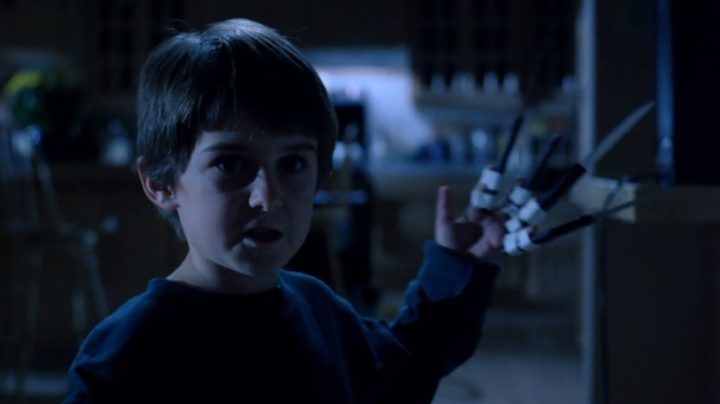
Visually, New Nightmare is an absolute delight from start to finish. Craven’s powerful camerawork, J Peter Robinson’s brash orchestral score, Patrick Lussier’s scintillating editing, Mark Irwin’s ripe, technicolor cinematography and Langenkamp’s committed performance make for a thunderous symphony of pure terror, the kind of film all those shitty Nightmare sequels could only hope to be, and (by all accounts) a closer vision of what Freddy Krueger was always meant to be: mean, lean and utterly vicious. Craven sets up his nightmarish vision for the franchise well, as indelible a swansong for the brand before it sunk into the Freddy Vs Jason silliness of the post-millennial age. The climactic hellbound finale, in which Freddy, Heather and Dylan face off in a dungeon-set practical effects showcase, will have you legitimately sweaty-palmed, as the stakes are raised ever higher.
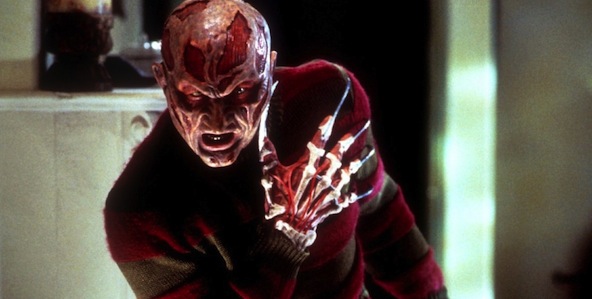
Langenkamp plays her role well, although shifted far from the helpless maiden of the original film and into a strong-willed, formidable opponent for the hideous Kruger to engage with. She’s abetted by terrific turns from David Newsom, Tracy Middledorf (as Dylan’s babysitter, Julie, who replicates the ceiling death sequence from the original movie with astonishing potency), Fran Bennett as a well-meaning hospital doctor who treats both mother and son, and of course Robert Englund, reprising his turn as Freddy as well as “himself”. Englund’s physicality in the part makes for compelling screen villainy, stripped of his wit and simply going for broke as the monster he always should have been. It’s the kind of performance that makes me sad we couldn’t get more of this in the previous films, instead of the cartoonish jester he tended to become. Minor roles to Lin Shaye (Insidious), Tuesday Knight and New Line producer Marianne Maddalena as herself provide some point-at-the-screen moments of acknowledgement to fans and industry types, and Craven’s ability to garner commendable performances from the non-actors within is a surprise I wasn’t expecting.
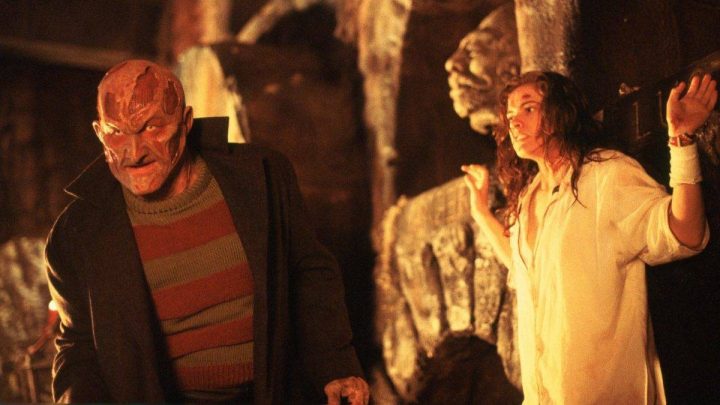
New Nightmare is easily the best film in the franchise, and in actuality it’s not even set within the main films’ continuity. It’s a sequel-sidebar if you will, an Elseworlds story using the franchise’s iconic motifs and Freddy Kruger’s ghastly silhouette to generate an acutely terrifying voyage into meta-madness. Although many will point to the original film, or even Scream, as his career highlights, to my mind his best self-contained work was in this movie, as himself, writing as pure a horror as there has ever been. Scream may have kick-started the homogeneous slasher genre again, and the original Nightmare may have birthed the supernatural horror genre into a nascent 80’s crowd, but New Nightmare distilled the very best of Craven’s imagination and focused it like a laser on absolutely scaring the bejeebers out of the audience.

